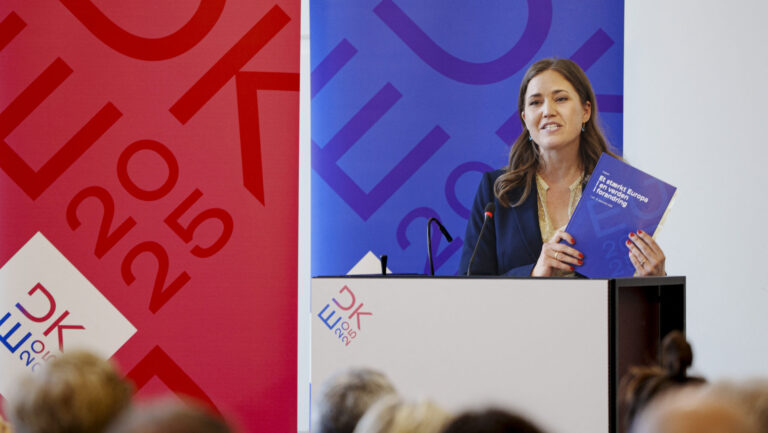The European Commission (EC) on 22 July said it had mandated Budget Commissioner Johannes Hahn to inform Budapest of the measures that the EU executive intends to propose to the European Council if Hungary’s ‘remedial measures’ in response to the concerns of past rule of law reports are not adequate.
‘Hungary has now one month within which it can submit its observations and any additional information, in particular on the proportionality of the measures envisaged by the Commission,’ the Commission said in a statement.
This seems to be the last deadline set for Hungary before the Commission asks European Union governments to suspend some of the funds Hungary is to get under the 2021-2027 budget.
The deadline is part of the so-called “conditionality mechanism”, meant to protect the EU’s financial interests against breaches of rule of law by an EU government. The Commission believes EU money is at risk in Hungary because of what it says is corruption, which can take the form of tenders for EU funded projects in which only one bidder, usually linked to the ruling party, takes part. The EU executive also has concerns about the independence of the judiciary, media and non-governmental organisations.
The Commission believes EU money is at risk in Hungary
The Commission launched the mechanism against Hungary in April, marking the first time it has been used against a member state. The procedure, in the end, could lead to the suspension of the 21 billion euros ($21.3 billion) for Hungary in the EU budget. All payments granted from 1 January 2021 could be affected by the suspension: cohesion aid, money for agriculture and the money from the recovery fund – the EU in fact has yet to approve Hungary’s Reconstruction and Resilience Facility Plan as well.
The announcement of the one-month deadline came just over a week after the Commission published its annual rule of law report. Unsurprisingly, the report’s chapter on Hungary said the Commission is still not happy with the Hungarian government’s performance in addressing the objections formulated earlier by the Commission, among others, the ones against the country’s corruption monitoring and prevention mechanisms.
The European Union’s executive seems to be applying a double standard to Hungary
Let us leave aside for the moment the absurdity of the EU institutions’ intransigence versus Hungary. Threatening an EU member state amidst the Ukraine war to withhold funding it is actually entitled to and a large part of which would serve to alleviate its dependence on fossil fuels, including Russian gas, is rather surreal. But the Commission, albeit under pressure from the left-liberal dominated European Parliament (which went as far as to sue the Commission last October for failing to trigger the rule of law procedure against Hungary) attempting to coerce a country to change some of its domestic policies while also insisting the same country should share what gas it has with those countries that have been foolish enough to destroy their own energy sources and supply routes is unpalatable, to put it mildly. Especially as the European Union’s executive seems to be applying a double standard to Hungary, while pretending to be deaf and blind about systemic violations of EU norms in the case of other countries, as I will demonstrate below.
But before looking at some examples of the bias the Commission and the European Parliament (EP), for that matter, display, let us take a quick look at how the rule of law conditionality was put into practice and why it is problematic. Many have dubbed the rule of law conditionality mechanism “the younger sibling of Article 7,” not by accident. EU institutions have been threatening Hungary with implementing Article 7, also referred to as the EU’s “nuclear bomb” option, since 2018, with an endless series of hearings in the European Parliament. It is quite obvious that the bomb will not be dropped, firstly, because the entire procedure rests on shaky factual and moral grounds and secondly, because such an unprecedented move may very well have irreversible consequences for the entire Union. So instead of attempting to remove Hungary’s voting rights, the EP and the EC devised a way to “starve” disobedient countries, in the hope of creating sufficient discontent among the populace to make them turn on their elected governments. Foreign ministers of Germany, Denmark, the Netherlands and Sweden first proposed in 2013 to link the pay-out of EU funds to respect for rule of law principles. Although it was not set out clearly, the mechanism, drawn up later under the presidency of Jean-Claude Juncker, was mainly targeted at Hungary.
The introduction of a rule of law conditionality mechanism was agreed on by the European Council and the European Parliament in November 2020. As EU institutions can only act in accordance with the Treaties, the mechanism only sanctions wrongdoing that ‘affect or seriously risk affecting the sound financial management of the EU budget or the protection of the financial interests of the EU’. This, by the way, was something Viktor Orbán had pushed for successfully at the time, insisting that withholding funding based on the scrutiny and assessment of any other aspect of the way an EU member state’s democracy functions is outside the purview of EU institutions, which indeed it is. However, it is an obvious intention of several old Member States to extend the scope of the mechanism to other fields, such as broadly understood human rights violations. The fundamental problem with the whole idea is that there is no solid, commonly agreed baseline as to what the desirable quality of rule of law is and there is no sound legal basis in the Treaties to really justify the mechanism. In 2020 Hungary and Poland in fact challenged the decision on the rule-of-law mechanism at the European Court of Justice (ECJ). But legal barriers to launching the mechanism were cleared in early 2022 when the EU’s top court turned down the appeal.
Whatever the ruling of the ECJ was, it remains a fact that the rule of law is a fluid, malleable concept, so the requirement of a certain “level” or “quality” of the rule of law may end up being applied in a partial way, with large, Western European EU member states held against a different standard than “troublemaking” new members like Hungary or Poland. Which is indeed the case.
Firstly, it is worth noting that neither country stands out in terms of the number of infringement procedures they are facing. As I pointed out 2021 paper, if we look at the period between January 2015 and January 2021, we find that there were 63 active cases brought against Hungary, while Poland was facing 85. By comparison, 86 proceedings were brought against Belgium, 91 against Greece, and 77 against Austria in the same period. As opposed to these countries, the Netherlands appears to be a well-performing, law-abiding member state, judging from the as few as 43 active infringement cases brought against it by the Commission in the six year period examined. Yet for anyone outside the Dutch political establishment, it is clear that the Netherlands is ‘one of the biggest conduits for tax avoidance in the world.’ As Boris Kowalski of the German Marshall Fund reminded last year, according to a 2017 study, the Netherlands alone is responsible for channelling 23 per cent of all corporate offshore investments into destinations such as the British Virgin Islands.
There were 63 active cases brought against Hungary, while Poland was facing 85
Secondly, neither the European Commission nor the European Parliament seems to be concerned about the rights of ethnic minorities in the European Union. Ethnic Hungarians and Germans in Slovakia continue to face the consequences of blatant rule-of-law violations through the retroactive application of World War II-era laws called the Benes Decrees. The decrees were adopted in retaliation for the alleged collective responsibility of ethnic Hungarians and Germans living in Czechoslovakia for the collapse of the country and as a punishment for their, again alleged and collective, collaboration with the occupying German and Hungarian forces. The Benes Decrees are still in force, and permit the seizure of private property of individuals belonging to these ethnic groups. Independent NGOs and media reports have confirmed that the decrees are still abused by the Slovak government to expropriate land. This is clearly unjust practice that has no place in a democratic society in 21st-century Europe and would merit the attention and outrage of the EU institutions – except it does not.
In spite of the questionable nature of the entire procedure, the Hungarian government, clearly in order to salvage funding it badly needs, has been willing to fully cooperate with the European Commission. top Hungarian officials have said over the past weeks Budapest was willing to work with the Commission to address the concerns. Just last week Hungary offered to cut the number of public tenders in which only one bidder participates to 15 per cent of the total. It has also offered to allow courts to order prosecutors to pursue cases even if prosecutors had decided not to and to make law-making in Hungary more transparent and inclusive.
The Hungarian public procurement process’ effectiveness is ‘medium’
In a recent podium discussion that we reported on in this article, Mr. Navracsics commented that the way the Hungarian government sees it, the EU’s concerns about Hungary’s public procurement system are exaggerated. He cited a study by the European Commission on the transparency and competitiveness of public procurement in all EU countries, which found that the Hungarian public procurement process’ effectiveness is ‘medium’. The minister reminded that public procurement is highly transparent in countries such as France and the Nordic countries, it is moderately transparent in Hungary, Germany and Ireland, while in terms of the effectiveness of public procurement Spain, Italy, Romania, and even Austria perform much worse than Hungary – according to EU Commission sources. Mr. Navracsics, while not denying the existence of shortcomings in the Hungarian system, remarked that the Commission’s own studies do not justify the profound concerns about corruption and the rule of law in Hungary that the EC tends to cite during the negotiations.
Mr. Navracsics expressed his worry about the EU’s unwillingness to work towards an agreement with Hungary and the lack of clear requirements and expectations from Budapest. He concluded that the ball is now in the EU’s court to make the deal happen, as Hungary is ready for the agreement. We will see whether the Commission is ready, too.








